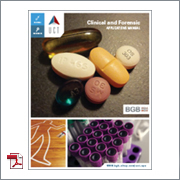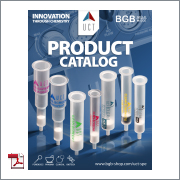Part Number |
Products |
Price |
Qty / Buy |
|---|---|---|---|
| UCT-EUTAX111 | Enviro-Clean TAX Cartridge, 100mg, 1mL, pk.100 | CHF 183.00 |
|
| UCT-EUTAX153 | Enviro-Clean TAX Cartridge, 500mg, 3mL, pk.50 | CHF 158.00 |
|
| UCT-EUTAX156 | Enviro-Clean TAX Cartridge, 500mg, 6mL, pk.50 | CHF 160.00 |
|
| UCT-EUTAX1M6 | Enviro-Clean TAX Cartridge, 1000mg, 6mL, pk.30 | CHF 136.00 |
|
| UCT-EUTAX11Z | Enviro-Clean TAX Cartridge, 100mg, 10mL, pk.50 | CHF 115.00 |
|
| UCT-EUTAX110M75 | Enviro-Clean TAX Cartridge, 10000mg, 75mL, pk.10 | CHF 156.00 |
|
Enviro-Clean® TAX (Tri-Acetic Acid)

Compounds are retained on hydrophilic sorbents through polar interactions including hydrogen bonding, pi-pi or dipole-dipole interaction. These types of interactions occur when a distribution of electrons between individual atoms in functional groups is unequal, causing negative and positive polarity. Compounds typically extracted on a hydrophilic column include analytes which have polar groups, including amines, hydroxyls and carbonyls. Elution is performed by strong polar solvents.
Sorbent Specifications:
- Characteristic: Cation Exchange Phase
- Organic Loading = 7.5%
- Average Pore Size = 60Å
- Surface Area = 500 m²/g
- Pore Volume = 0.77 cm³/g
- Anion Exchange = 0.150 meq/g
- Cation Exchange = 0.100 meq/g
- Support = Silica
- Sorbent = Triacetic acid
Application: Chelator for metal ions. i.e. tin, palladium, copper, ruthenium, chromium, nickel
![]() UCT Food Safety & Environmental Product Catalog 2017
UCT Food Safety & Environmental Product Catalog 2017
Index





